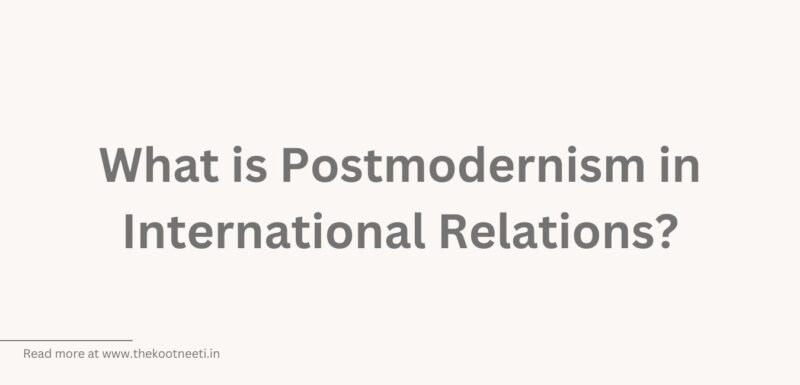What is Postmodernism in International Relations?

Postmodernism is a philosophical approach that challenges the assumptions and conventions of modernism, and is characterized by skepticism towards grand narratives and universal truth claims.
In the field of international relations, postmodernism is a perspective that challenges the traditional assumptions and paradigms of international relations theory, and seeks to incorporate a more diverse range of perspectives and approaches. Postmodernist approaches to international relations often emphasize the role of language, culture, and power in shaping international relations, and reject the idea of objective truth or universal laws in favor of a more relativistic understanding of international politics.
Postmodernist approaches to international relations have been influential in the development of alternative theoretical frameworks, such as constructivism and critical theory, and have contributed to a more nuanced and complex understanding of international politics. However, postmodernism in international relations has also been the subject of much criticism, with some scholars arguing that it is too skeptical and relativistic and that it fails to provide a coherent framework for understanding international relations.
Postmodernist feminism
Postmodernist feminism is a perspective within feminism that is influenced by postmodernist philosophy, and that seeks to challenge the assumptions and conventions of traditional feminism.
Postmodernist feminists argue that traditional feminist theory has been too focused on universal experiences and categories, and that it has failed to adequately take into account the diversity and complexity of women’s experiences. They argue that traditional feminism has often been based on essentialist understandings of gender and has neglected the role of race, class, and other social identities in shaping women’s experiences.
Postmodernist feminists seek to incorporate a more diverse range of perspectives and approaches into feminist theory, and to challenge the traditional dichotomies and binary oppositions that have characterized much of feminist thought. They argue that feminist theory should be more self-reflexive and self-critical, and should be open to the possibility of multiple and conflicting interpretations of women’s experiences.
Postmodernist feminism has been influential in the development of alternative feminist theoretical frameworks, such as intersectionality, and has contributed to a more nuanced and complex understanding of women’s experiences. However, postmodernist feminism has also been the subject of much criticism, with some feminists arguing that it is too skeptical and relativistic and that it fails to provide a coherent framework for understanding and addressing the challenges facing women.


















